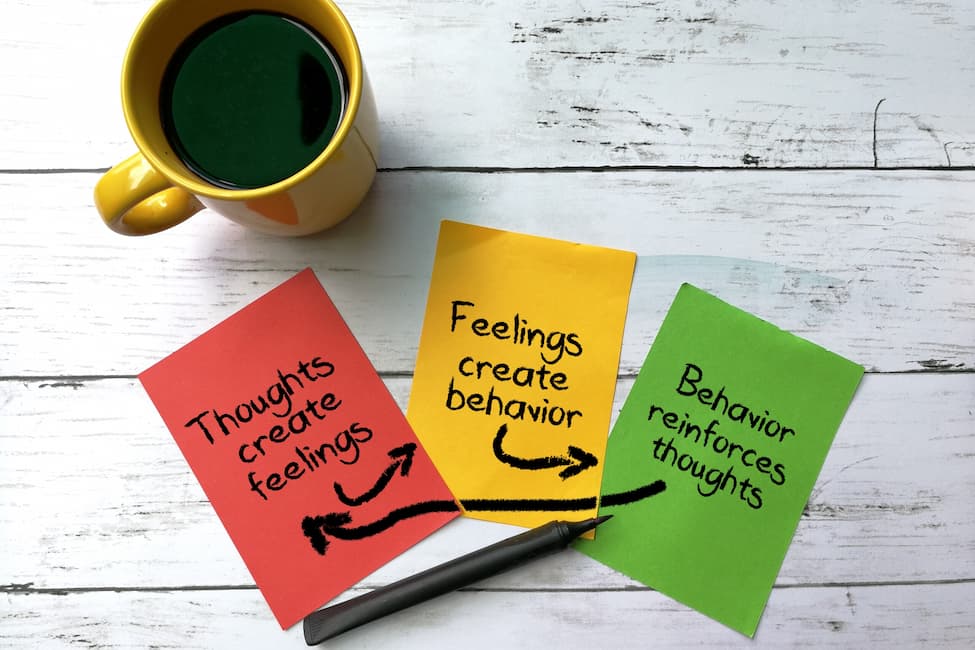
Cognitive-behavioral therapy is a highly effective treatment modality for people struggling with substance use disorder and other addictive behaviors. Cognitive-behavioral therapy techniques are designed to address negative or harmful patterns of thinking and behaving while offering effective strategies for managing addiction and their co-occurring disorders.
What Is Cognitive-Behavioral Therapy?
Cognitive-behavioral therapy is a type of therapeutic intervention that is proven to be beneficial for various disorders, notably anxiety disorders, depression, drinking, substance misuse problems, marital conflicts and food disorders. Many clinical studies indicate that cognitive-behavioral therapy techniques are linked to substantial positive changes in behavior and overall well-being. There is abundant research suggesting that when cognitive-behavioral therapy is applied in conjunction with pharmacotherapy to treat addiction, it is as helpful as, or even more helpful than, other forms of counseling. Cognitive-behavioral therapy is an intervention with a strong empirical basis; the procedures applied will yield real results.
Several fundamental concepts drive cognitive-behavioral therapy, including:
- Many emotional disorders influence and are influenced by flawed or harmful thinking patterns.
- onsistent episodes of negative actions and attitudes can result in emotional disorders.
- Individuals struggling with mental health issues can develop more effective strategies for managing them, making symptoms less acute and building more active, satisfying lives.
Cognitive-behavioral therapy offers highly effective recovery strategies for people struggling with substance use disorders. The following interventions are among the most commonly used and highly successful treatments, including addiction intervention services that can help individuals take the first step toward recovery.
Activity Scheduling
Sometimes, depression or anxiety disorders can lead to social withdrawal and inactivity. A major purpose of activity scheduling is to encourage behaviors that result in positive, healthy outcomes. By routinely participating in helpful behaviors and activities, people struggling with depression-related inactivity or lack of motivation can accomplish necessary tasks reliably. These activities might include getting regular exercise, visiting friends and family, cleaning the house, or engaging in mindful meditation.
Cognitive Restructuring
A cognitive distortion is a term for persistently framing thoughts in inaccurate, unhelpful and even destructive ways. Cognitive restructuring is a cognitive-behavior therapy technique used to identify such negative or destructive thinking patterns and approach challenges rationally. This approach, often referred to as CBT for heroin addiction treatment, involves a collection of tactics working in tandem to improve thought processes. Rather than a particular technique, it includes analyzing thoughts during challenging moments, recognizing cognitive distortions, and testing the accuracy of such thoughts in hypothetical and real-world situations.
Graded Exposure Therapy
Exposure is a cognitive-behavior therapy technique; it enables people to confront their fears methodically.
People generally avoid situations that cause them to feel fear. However, persistently avoiding such situations perpetuates negative feelings and symptoms of anxiety and panic. Graded exposure therapy is a therapist-guided approach to exposing people to circumstances they fear. By routinely exposing themselves to feared circumstances and systematically developing strategies for managing the resulting anxiety, people can begin to cope with their fears calmly and rationally over time.
Mindfulness Practice
Mindfulness, a concept based upon Buddhist principles, forms the core of cognitive-behavioral therapy. Mindfulness practice involves concentrating on the present rather than dwelling on the past or the future. Practitioners can recognize their thoughts and emotions through mindful meditation without judging them. This technique is particularly helpful for people struggling with depression and anxiety disorders.
Skills Training
Without basic life skills, it is extremely difficult to navigate challenging circumstances successfully. Cognitive-behavioral therapy provides training in the basic skill sets that allow us to interact with others effectively and healthily. This training includes instruction in mastering interpersonal skills, communicating effectively and assertiveness. Generally, skills are taught through individualized training, modeling and simulation, in addition to problem-solving techniques.
Successive Approximation
Cognitive-behavioral therapy can benefit individuals who have trouble starting or finishing tasks because they feel overwhelmed, unfamiliar with the tasks, or unable to accomplish them to a particular, sometimes irrational, standard.
Successive approximation addresses reluctance to start tasks by teaching how to redefine tasks as a sequence of small, achievable goals. To learn a difficult task, people first succeed at a simpler task related to or similar to the more challenging one. This approach is similar to practicing a musical instrument; once you learn basic techniques, you can advance to more complex and challenging skills. After consistent practice and increasing your familiarity with the instrument, learning new techniques becomes easier. Similarly, being able to learn and master simple behaviors assists you in adopting more complex ones.
Not all cognitive-behavior therapy sessions will integrate each of the above techniques into every practice. The therapist will create a unique treatment plan based upon the client’s concerns, the severity of the addiction disorder and personal circumstances.
Cognitive-behavior therapy offers people the tools and skills to act as their own therapists and advocates. With activities in the course of therapy and exercises outside of it, clients are empowered to create strategies for learning to modify their perceptions, negative reactions, and behaviors. This approach is particularly effective in CBT for cocaine addiction, as it helps individuals address the underlying issues contributing to their substance use.
To learn more about our approach to cognitive-behavioral therapy, please visit our CBT therapy page. If you’re ready to begin your recovery journey, please contact the team at The Raleigh House to begin the intake process. We’re here to help.
